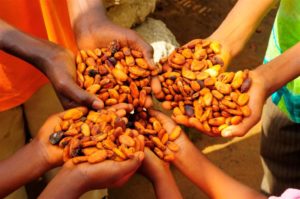
December 8, 2017//-Let us again take a look at agribusinesses that can guarantee uninterrupted stream of income. One common denominator among these businesses is that they require reasonable capital for investment, large expanse of land, long gestation period before return on investment.
However, be rest assured that with some cash at your disposal and some level of patience, you can own a business empire that would continually multiply your return on investment with minimal costs after the initial investment. If you like, call them cash machines, and you are right.
Oil Palm Production
Oil palm tree is among the best-known, most extensively cultivated plants because of its potentials to create enormous wealth. It is a plant of inestimable value because a lot of products can be obtained from oil palm tree – palm oil, palm wood, palm nuts, palm wine, broom sticks and many more. Each of these products can fetch fabulous amount of wealth.
Almost every part of the tree is useful and commercially viable. Each of them can be processed into other commodities. That is why a country like Malaysia depends largely on palm oil exports for their economy.
Oil palm plantation is money spinning and offers opportunity for all to live a healthy and happy life. For those who have reasonable capital and large piece of land, they can embark on oil palm plantation.
Once planted and nurtured to maturity, one would continue to reap bounteously as long as one lives. The market is large both locally and internationally. Palm trees do well in the southern and some middle belt states of Nigeria.
Cross River, Akwa Ibom, Ekiti, Delta, Bayelsa, Ogun, Rivers, Anambra, Ondo, Enugu, Imo, Oyo, Abia, Edo, Ogun, with Cross River, Delta, Ondo and Edo are the main oil palm producing states.
Cocoa Farming
Cocoa was one of the main cash crops that were the mainstay of the Nigerian economy before the oil boom era. When you plant cocoa and nurture it to maturity, you harvest cash from it for many decades. It can even outlive the owner. The main producing states are Cross River and South West states of Ekiti, Ogun, Ondo, Osun and Edo.
The highest producing states in the country are Ondo, Osun, Cross River, Ekiti, Oyo, Edo and Ogun states.
Rubber Farming
Rubber was also one of the prime movers of the Nigerian economy in the 1960s and before the oil boom. Rubber was the major source of employment for the people in the Midwest Region of the country. It is time to replicate the feat in this cash crop as we are now thinking of diversifying the economy from one dependent on oil to one driven by agriculture.
An investment in rubber plantation is an all-time revenue generating machine. All you need is a drained piece of land, sandy loam. Rubber plantation does very well in the Southern states of Delta, Edo, Ondo, Ogun and Cross River.
Cashew Plantation
This is another cash machine. Nigerians are making money exporting cashew nuts annually. Cashew nuts are in high demand in China, India and other fast-growing economies of the world.
The nuts are exported to India and Vietnam where they are processed and either consumed in those countries or shipped to the United States or to Europe for further processing and packaging.
Cashew trees grow anywhere in the wet and dry tropics. The trees grow like any other weed at an average temperature of about 10oC or 50F. They are draught-resistant and grow very well in sandy soils, even in marginal soils where other crops would not survive. It starts fruiting in about two to three years of planting but grafted cashew trees can fruit in 18 months.
There are many ways you can be involved in cashew business. You can be a farmer, an agent/distributor, supplier and exporter. To play as a farmer, you need land for a cashew plantation, which could be acquired in a number of ways, including renting or leasing.
Plantain Farming
Plantain is one of the staple foods in Africa and other developing countries of the world. Nigeria is one of the largest producers of plantain in the world. According to International Institute of Tropical Agriculture Youth Agripreneurs Manual, plantain is ranked third among starchy staples in Nigeria thus occupying an important position in the food chain in the country.
Yet, the production, which is in the hands of smallholder farmers, is mainly for local consumption.
Today, there is increasing interest in plantain production meaning that Nigeria could be one of the largest producers of plantain not just for local consumption but also for earning the much-needed foreign exchange. You could be part of this revolution by tapping into this very profitable agribusiness and contribute to a diversified economy in Nigeria.
Plantain is a drought-tolerant and herbaceous (no woody stem) plant that grows from an underground mass of roots. It grows well in tropical, moisture-rich, humid, low-lying soils.
The full grown plantain plant flowers at the top in-between the leaf clusters and eventually grows into a bunch and may have between three and twenty hands. Each bunch holds fingers ranging from five to 10 fruits. The raw green plantain ripens to an enhanced flavour and sweetness as its starch converts to sugar.
Independent.ng


